Interview: Aaron Ellis on Portraying Leo Frank in PARADE at Simi Valley Cultural Arts Center
Presented by Actors’ Repertory Theatre of Simi Valley through March 24
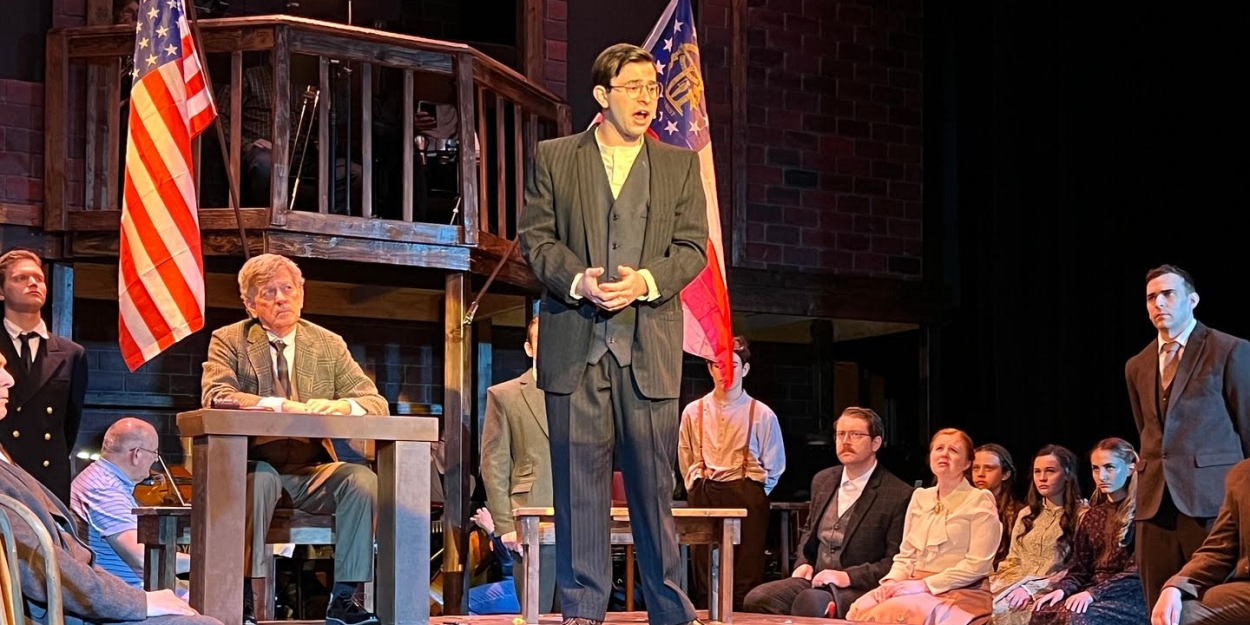
Actors’ Repertory Theatre of Simi is presenting Parade with music and lyrics by Jason Robert Brown and book by Alfred Uhry, directed by David Ralphe with choreography by Julie Denney Hamann, featuring a live orchestra under the baton of Gary Poirot.
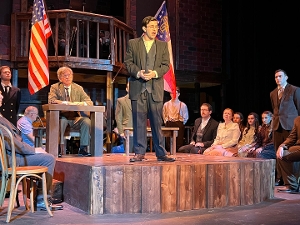
The musical, a dramatization of the 1913 trial and imprisonment, and 1915 lynching, of Jewish American Leo Frank in Georgia, premiered on Broadway in December 1998 and won Tony Awards for Best Book and Best Original Score (out of nine nominations) and six Drama Desk Awards.
Leo Frank led a comfortable life as a Jewish American in New York City who transferred to Marietta, Georgia to manage his wife’s uncle’s pencil factory. In 1912, he was accused of raping and murdering one of the young factory girls during the town’s July 4th parade, and was brought to trial where he was unjustly convicted. Although the story line addresses the injustices of racism and antisemitism, it is softened by a hauntingly beautiful score, highlighting the love between Leo and his wife, Lucille, who created many lighter moments for the pair throughout his imprisonment.
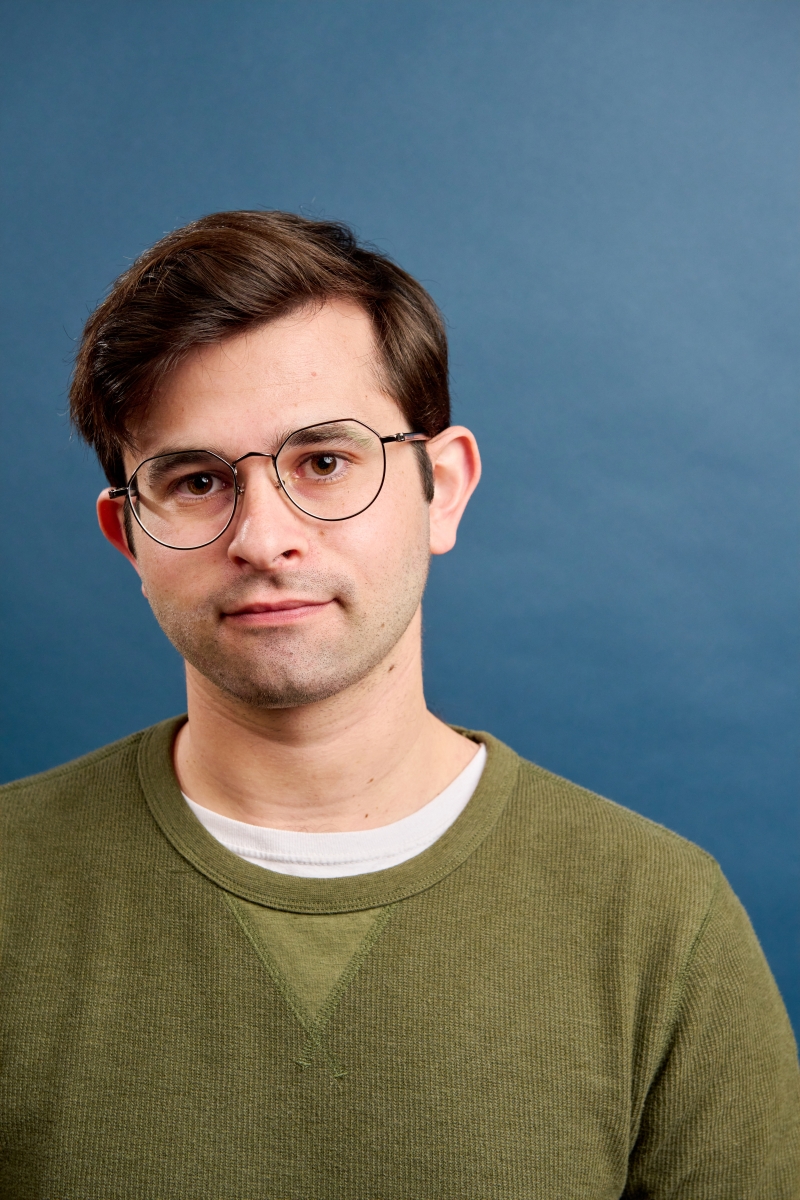
I decided to speak with actor Aaron Ellis (pictured) on what it means to him to be taking on the role of Leo Frank, especially since the resurgence of racism and antisemitism are running rampant in the world today.
Thank you, Aaron, for speaking with me today. Please tell me about your theatrical background prior to Parade.
I went to Agoura High School which had a program called ComedySportz. This was a way for students to learn and perform short-form improv. I would watch their shows in awe and eventually made it onto the team my Junior year. As I began to make friends within this program, I slowly transitioned from a band kid to a theater kid. Moorpark College gave me more opportunities to explore the different roles within the theater world, and this is where I truly fell in love with acting. Up until I graduated from Cal State Northridge last year, I was always taking improv classes at The Groundlings, and participating in as much community theater I could pull off with my busy college schedule. Throughout college, I was always so thankful to community theaters for giving me the space to exercise the muscles I had been working on in classes.
Are you a native New Yorker like Leo Frank?
I have lived in the beautiful town of Agoura Hills right outside of Los Angeles my whole life. My dad is from Philadelphia, if that counts.
Have you performed as Leo Frank before?
Sort of. I played Leo in a small scene for someone’s directing class assignment during my last semester of college. So, no. Not really.
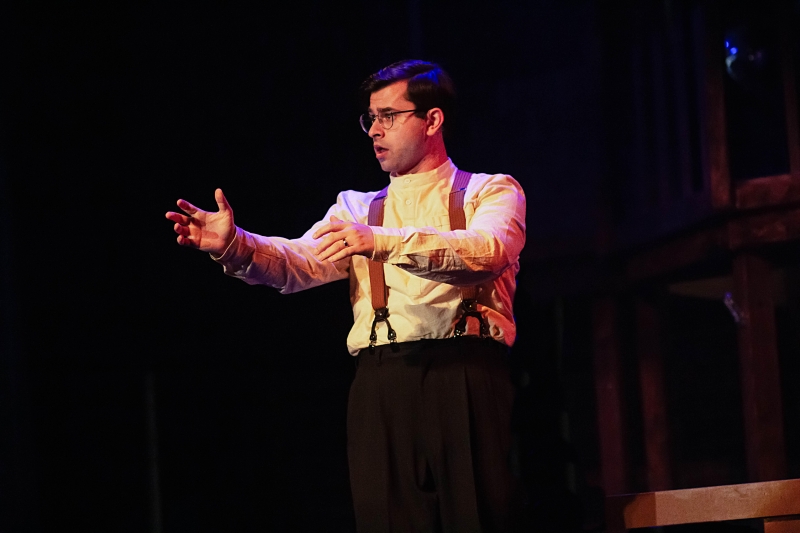
What made you decide to take on such an iconic role? And have you seen Parade performed onstage before?
I’ve never seen the show before. I was hungry for an acting challenge as soon as I graduated. Towards the end of high school and beginning of college, I became comfortable with the musical comedy. One semester I did Spamalot, Avenue Q, and Little Shop of Horrors all back-to-back. When I realized Parade was being done 20 minutes from my house, I thought it would be the perfect opportunity to explore performing a tragedy. I also knew that it was a show that dealt with themes of what it means to be Jewish in America, something I have been thinking about a lot lately.
Why do you think Leo decided to stay in Georgia after he realized how his New York Jewish heritage was looked down upon by locals there?
In the first couple scenes of the show, it is implied that Leo feels trapped in his life. He spends time daydreaming about going back to New York, but is too deep into his professional life in Georgia to do anything about it.
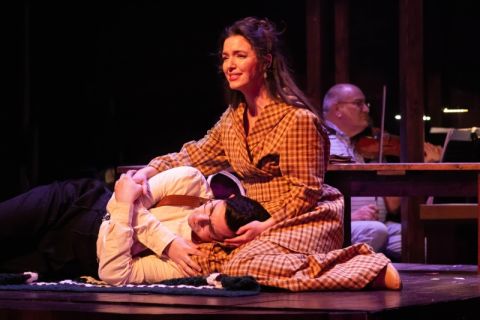
It’s apparent that Leo truly loves his wife, who was raised in a rather non-religious Jewish family in the South. Why do you think the locals accepted her family so much more than Leo?
Even though she was Jewish, it is implied that she is still a Georgia girl who has no problems with the Southern customs. Leo comes into town from New York with a college education. A fish out of water. Of course, he would stick out like a sore thumb.
Why do you think Leo decided to stay true to his Orthodox Judaism rather than go along with his wife’s more reform family’s practices?
Leo’s faith is more important to him than anything. Leo is very alone and isolated in this play, which doesn’t occur to him because of his devotion to God. Without spoiling the play, even when he has everything stripped away from him, the only thing he has left is his trust in God.
If your partner asked you to move to a city where you knew you would not feel welcome today, would you go? Why or why not?
This is an interesting question because I would like to think that parts of America have changed since the period this play takes place. If there’s anything I’ve learned in my old age of 23, that probably isn’t as true as I would hope it to be. I still have faith in human beings and I don’t want to make assumptions about places I’ve have never been to before. That being said, I would probably negotiate a weekend trip to Vegas instead.
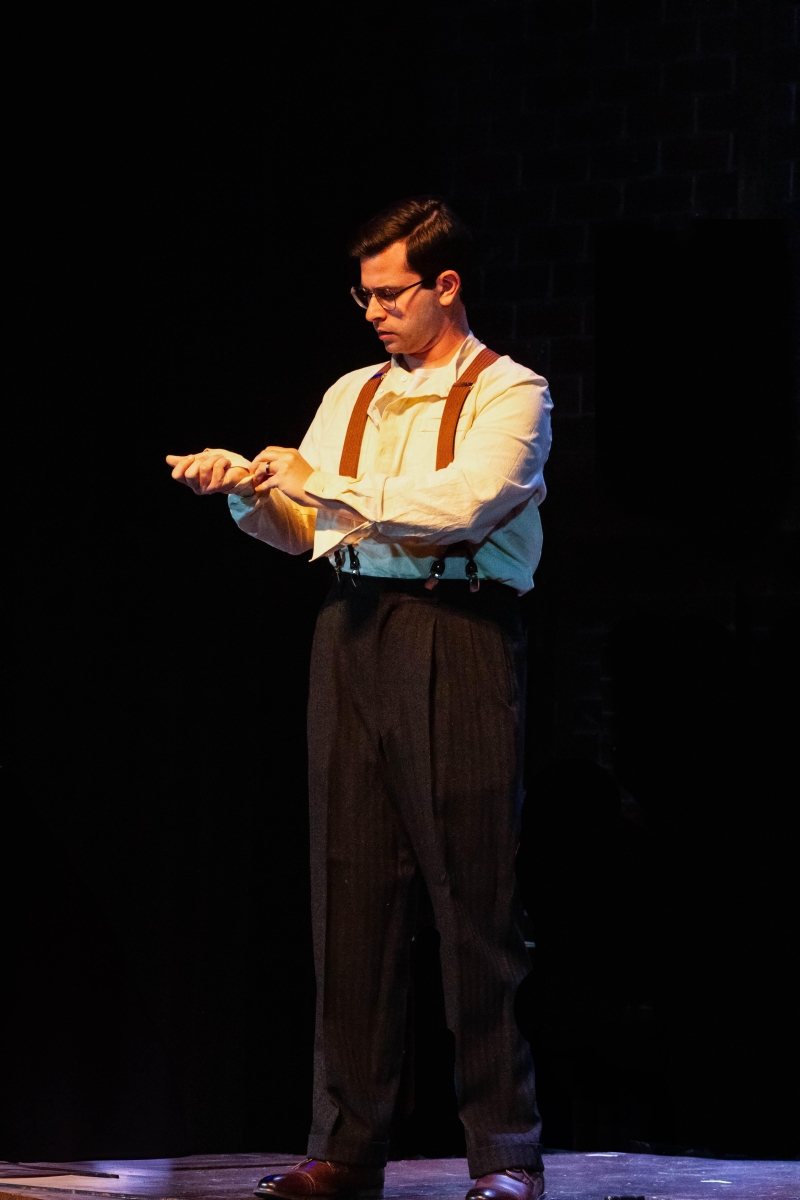
How did you research the history of the case prior to and while rehearsing the show?
This is the most prep work I have done for a show. My father, Cantor Kenny Ellis, and I read from his collection of Jewish Encyclopedias which was a great resource. Fellow cast members would share their research with me which helped me along the way of the rehearsal process. I cracked open a Stanislavski textbook. I read and watched a lot of historical tragedies. I studied plays that I thought had a lot of parallels to this musical. I went back to Arthur Miller’s The Crucible which really helped me figure out how I would play a lot of the climactic scenes.
Tell me about the actor portraying your wife, Lucille.
Her name is Samantha Craton and she’s a hoot! She runs a Simi Valley smoothie bar called The Core, you’ve got to check it out. I truly don’t think this show would be what it is without her. I have learned so much about myself as a performer simply by working with her throughout this process so far.
Had you ever worked with her before?
Nope! I met her for the first time at our first rehearsal in January. It’s very intimidating to meet your pretend wife for the first time, but she was so sweet from day one.
How has your friendship changed since taking on these two roles together?
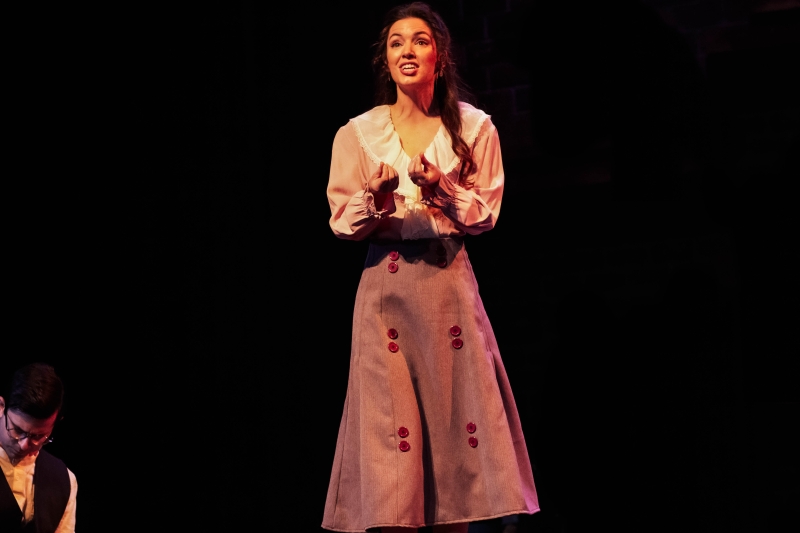
Samantha Craton portrays Lucille Frank in Parade.
There was never a moment in this process where I didn’t trust Sam. We have to be very vulnerable in this show, and we always did a good job of checking in with each other to make sure we’re comfortable. Exploring this material can be scary, but she always made me feel safe.
Do you have a favorite scene between Leo and his wife? Why that one?
I love performing our Act Two duets together. Getting to harmonize a big last note with her is such a breath of fresh air after yelling at her for a while.
What have you personally learned about yourself while performing the role?
This was the hardest role I’ve taken on so far, and I often felt like I wasn’t doing enough. I still never feel satisfied with any performance, like I should be doing more. I learned to not look at this as a negative thing, but rather use it as inspiration to keep trying my best the next time. If there’s something I don’t like, just move on and fix it tomorrow.
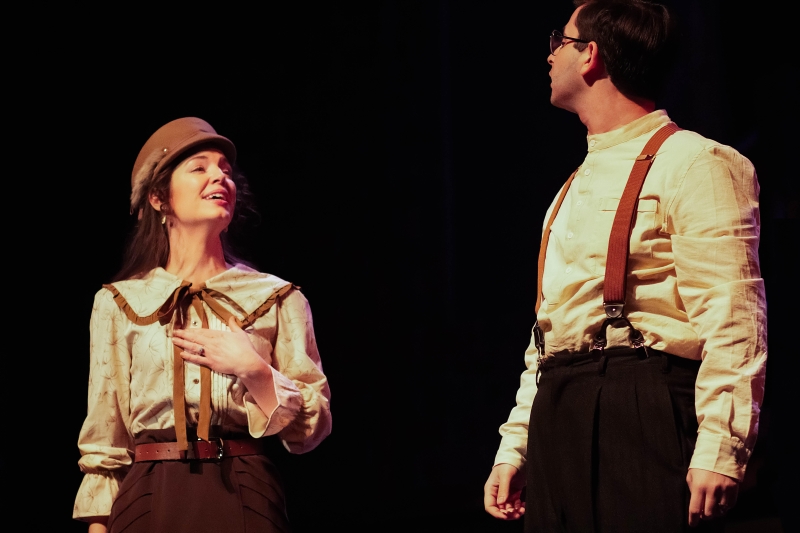
What do you hope audiences will change about the way they live their own lives after seeing Parade?
I hope that audiences realize Leo Frank’s narrative is just one story in this country’s flawed history. There can’t be a full-length Jason Robert Brown musical for every mishap in our justice system. It hurts to think about how often this kind of case happens to any minority who may be innocent in a town of peers looking for a scapegoat. Yes, this musical is chilling when you realize how relevant this story is one hundred years later, but I also hope audiences can leave with a sense of hope knowing we can do better if we just treat each other like human beings.
Is there anything else you’d like to add about yourself or the musical?
I would just like to say how proud I am of this entire cast. This was not easy material to throw together when everyone’s tired after long days of work or school. I would also like to thank the leadership of director David Ralphe. His passion for telling this story as authentically as we possibly can has been so inspiring for all of us. Everyone is so committed to telling this story and has been treating the difficult subject matter with such respect. I also want to give my dad another shout out for his support throughout this process. His love of Jewish music has influenced so much of my life, and it feels like an honor to finally pay tribute to my upbringing with this show. Please come see Parade! Support community theater!
Thanks so much, Aaron.

Parade performance take place at the Simi Valley Cultural Arts Center, 3050 Los Angeles Avenue, Simi Valley 93065 through March 24 on Fridays and Saturdays at 8:00pm, and Sundays at 2:00pm. Tickets may be purchased online at www.simi-arts.org or by phoning the Arts Center box office at 805-583-7900. Because of mature subject matter, this production is not recommended for children 14 and under.
Production photos courtesy of Actors’ Repertory Theatre of Simi
Comments
Videos

